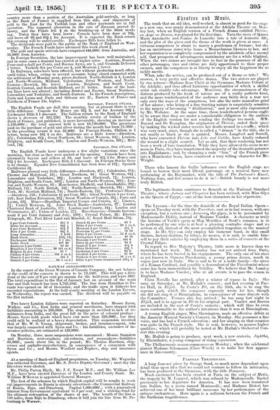ittatres an Muir.
The truth that an old idea, well worked, is almost as good for the stage as a new one, was amply demonstrated at the Adelphi Theatre on Mon- day last, when an English version of a French drama entitled Therese, ou -Inge 014 Dimon, was played for the first time. Turn the story of Queen Marie Antoinette and Jeanne de Lamothe into a tale of domestic life, and the plot of the piece and the theme of the work is given at once. A virtuous sempstress is about to marry a gentleman of fortune ; but she has an unvirtuous sister who bears a Menoechmian likeness to her, and her reputation is so completely compromised by the misdeeds of her second self, that prospects of advantageous matrimony are for a while blighted. When the two sisters are brought face to face in the presence of all the other personages, vice and virtue are duly apportioned to their proper owners, and the sempstress is at liberty to enjoy all the happiness she so richly merits.
What, asks the novice, can be produced out of a theme so trite ? We answer, A very pretty and effective drama. The two sisters are played by one actress—Madame Rose Cheri at the Gymnase, Madame Celeste at the Adelphi ; and thus afford histrionic opportunities of which a skilful artist can readily take advantage. Moreover, the circumstances of the distress produced by the freak of nature are of a really pathetic kind, and the more tenderhearted of the audience may fairly drop a tear not only over the woes of the sempstress, but also the more masculine grief of her adorer ; who being of a fine trusting nature is exquisitely sensitive to the misery of becoming " desillusione," and is most ably represented by Mr. Webster. At the same time, these tenderhearted persons ought to be aware that they are under a considerable obligation to the authors of the English version for not rending the feelings too much. MM. Bayard and De Beauplan, the originators of Therese, ended their piece by making the wicked sister receive her death-wound in a scuffle ; which was very cruel, since, though she is called a " demon " in the title, she is not nearly so black as she is painted. Messrs. Langford and Sorrell, who have converted Therese into Like and Unlike, have kindly reduced the wound to a slight scratch. Let us add, that their rendering has not been a work of bare translation. While they have allowed the scene to re- main in Paris, they have transformed the majority of the dramatis persona into Englishmen ; and, by changing a rude "lion" of the French piece into a Manchester beau, have contrived a very telling character for Mr. Wright.


























 Previous page
Previous page